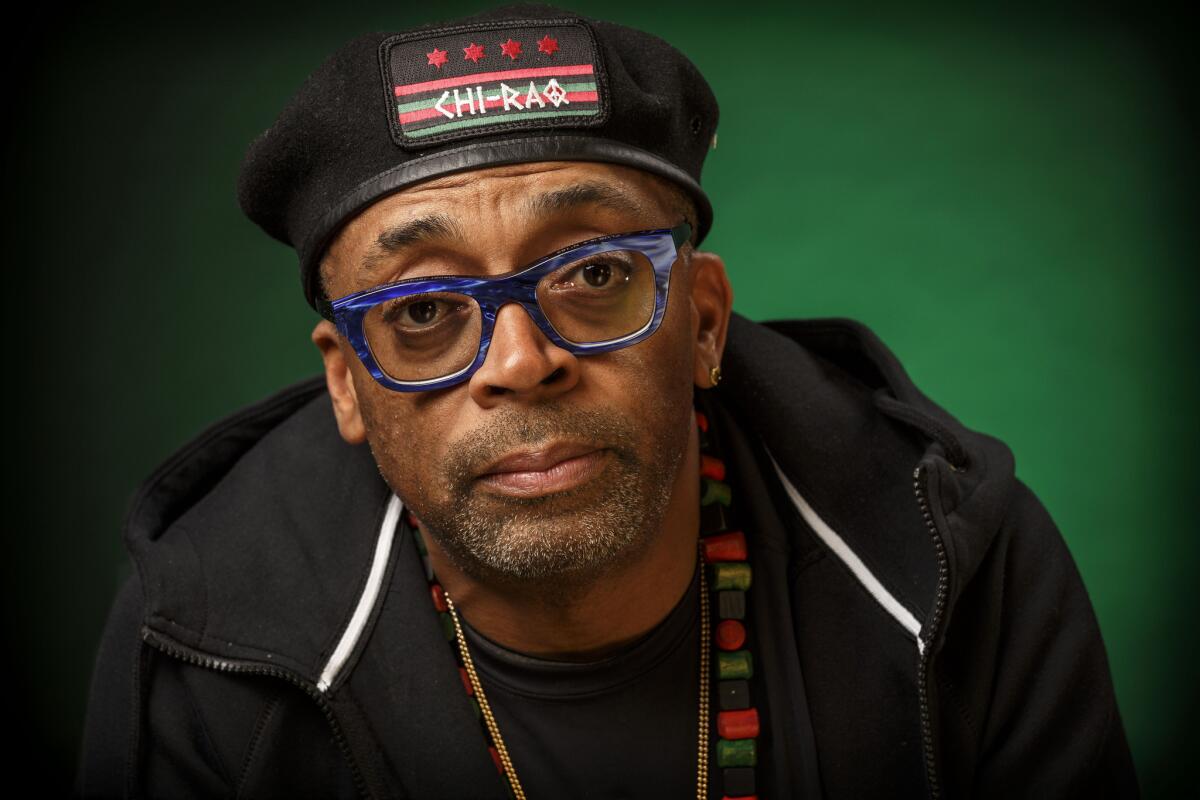Spike Lee and Jada Pinkett Smith to boycott Oscars; academy responds

Director Spike Lee, photographed in Beverly Hills in November. The filmmaker says he won’t attend this year’s Oscars ceremony.
- Share via
The backlash against this year’s Academy Award nominations escalated Monday with announcements by director Spike Lee and actress Jada Pinkett Smith that they would boycott the Feb. 28 Oscars ceremony, citing the absence of people of color in all four acting categories for the second year in a row.
If other prominent entertainment industry figures join the boycott, it has the potential to spoil Hollywood’s annual showcase event. And should large numbers of African American viewers tune out, it could dent ratings for the Oscars telecast — the primary source of revenue for the Academy of Motion Picture Arts and Sciences.
“It has such high ratings most years, so the image of Hollywood that the academy presents is at stake,” said Ana-Christina Ramón, assistant director and associate researcher at UCLA’s Ralph J. Bunche Center for African American Studies.
Ramon noted that the academy strives to present an image of diversity, an image that could be jeopardized by a boycott.
“People will take notice,” she said. “Even when they’re not nominated, minority actors are trotted out. They try to show diversity among presenters.”
“I am both heartbroken and frustrated about the lack of inclusion,” academy President Cheryl Boone Isaacs said in a statement released Monday night. “This is a difficult but important conversation, and it’s time for big change.”
She added that the academy would be taking “dramatic steps” to alter the makeup of its membership and to accelerate diversity efforts.
Lee’s decision to skip the Oscars had an extra sting because the academy recently bestowed the director with an honorary Oscar in November for his career work, which includes such racially charged movies as “Do the Right Thing” and “Malcolm X.”
It’s customary for honorary Oscar winners to attend Hollywood’s biggest night at the Dolby Theatre and to receive a moment of recognition during the telecast. But in a message posted to on his Instagram account, the outspoken director said that he and his wife, Tonya Lewis Lee, won’t be at the ceremony. Lee demanded to know “how is it possible for the [second] consecutive year all 20 contenders in the acting category are white?”
He added: “For too many years when the Oscars nominations are revealed, my office phone rings off the hook with the media asking me my opinion about the lack of African-Americans and this year was no different.”
His announcement came shortly after a Facebook video from Pinkett Smith in which the actress said she would not attend or watch the Oscars this year. Pinkett Smith, wife of “Concussion” actor Will Smith, said the academy has the right to acknowledge and invite whomever it chooses, but leaving black actors “begging for acknowledgment” diminishes the community. “We are a dignified people,” she said.
Will Smith, who doesn’t appear in the video, wasn’t nominated for “Concussion.”
Even with Chris Rock lined up as host, the announcement Thursday of the Academy Award nominations saw the return of the hashtag #OscarsSoWhite on Twitter as people expressed their anger.
The academy announced its nominations last week, and all of the 20 nominees in the acting categories were white for a second year in a row. In addition to Will Smith, other minority actors whose work drew plaudits include Samuel L. Jackson of “The Hateful Eight,” Idris Elba of “Beasts of No Nation” and Michael B. Jordan of “Creed.”
The film “Straight Outta Compton,” a fan and critical favorite with an African American cast and director, was also bypassed for a best picture nomination.
Lee’s Instagram message said that he “means no disrespect” to Oscars host Rock and producer Reginald Hudlin or to academy President Boone Isaacs.
He said the root of the problem lies in the industry’s failure to give people of color more opportunities to make films.
“As I see it,” the New York-based director wrote, “the Academy Awards is not where the ‘real’’ battle is. It’s in the executive office of the Hollywood studios and TV and cable networks. This is where the gate keepers decide what gets made and what gets jettisoned to ‘turnaround’ or [the] scrap heap.”
Through a representative, Lee declined to comment beyond his Instagram post.
The Bunche Center at UCLA releases an annual report on diversity in Hollywood. Its most recent study, released last year, reported that film studio heads were 94% white and all male and that film studio senior management was 92% white and 83% male.
The boycotts by Lee and Pinkett Smith are a “good thing because it draws more attention to the issue,” the center’s director, professor Darnell Hunt, said Monday. “To have prominent figures … to go on the record to lodge their outrage with business as usual keeps it in the conversation.”
Last year, the #oscarsowhite hashtag took off after David Oyelowo was snubbed for his turn as Martin Luther King Jr. in “Selma,” and the film’s director, Ava DuVernay, also failed to score a nomination. The last time a black actor won an Academy Award was when Lupita Nyong’o took home a supporting actress statuette for “12 Years a Slave,” released in 2013.
In his movies, Lee has frequently addressed the issue of racial unrest in contemporary urban society.
He received a screenwriting Oscar nomination for “Do the Right Thing,” his 1989 movie that explored seething resentments between blacks and Italian Americans in the Bedford-Stuyvesant neighborhood of Brooklyn.
His second nomination was for the 1997 documentary “4 Little Girls,” about the deaths of four young black girls during the bombing of a Baptist church in Birmingham, Ala., in 1963.
Despite these nominations, Lee has never won a competitive Oscar. His latest feature, “Chi-Raq,” earned the director his best reviews in years when it opened in December but failed to generate much awards-season buzz.
No stranger to controversy, Lee has garnered a reputation for sparing few feelings when it comes to race. He has taken aim at other filmmakers, including Clint Eastwood and Quentin Tarantino, for their cinematic depiction of blacks.
When accepting his honorary Oscar in November, he gave a speech that was critical of the studios and spoke about the lack of black executives in positions of power in Hollywood.
He later told The Times that “I get tired of [the conversation about diversity], but it’s necessary.”
Twitter: @DavidNgLAT
MORE:
Oscars 2016: Here’s why the nominees are so white -- again
Oscars 2016: The nominations are as white as MTV was in 1983 -- and it might cost the academy
#OscarsSoWhite creator on Oscar noms: ‘Don’t tell me that people of color, women cannot fill seats’
More to Read
Only good movies
Get the Indie Focus newsletter, Mark Olsen's weekly guide to the world of cinema.
You may occasionally receive promotional content from the Los Angeles Times.











